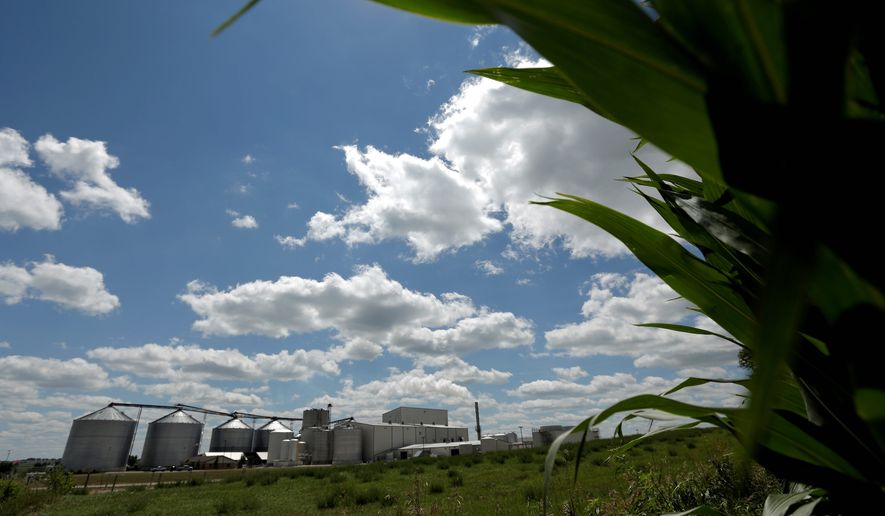Military veterans play an outsized role in the corn ethanol industry, but exactly what drives them to the field has become a bone of contention between ethanol proponents and oil and gas industry leaders.
Veterans make up about 19 percent of the corn ethanol workforce, according to federal Energy Department figures — the largest percentage of veterans in any energy subsector of the U.S. economy.
Veterans also comprise 18 percent of the woody biomass fuel/cellulosic biofuels sector, and many of those employees live and work in the Midwest, where the ethanol and biofuels industries have thrived.
No other part of the broader energy economy comes close to matching the veterans’ employment percentages in corn ethanol and cellulosic biofuels.
By comparison, veterans account for about 9.8 percent of the wind industry’s workforce and about 11 percent of the solar electrical generation employment rolls.
In addition, veterans make up about 9.8 percent of the natural gas production sector and 9.6 percent of the petroleum production industry, federal figures show. They also account for about 8.8 percent of the coal mining workforce and similar levels of employment in hydropower, nuclear and other corners of the broader energy world.
While percentages don’t tell the full story — especially because of huge disparities in the total number of employees in corn ethanol versus oil and gas, for example — ethanol backers say the high percentage of veterans can be attributed to military men and women’s recognition of the geopolitical dangers of foreign oil.
“This is an industry that is really about American national security,” said retired Army Gen. Wesley Clark, a former Democratic presidential candidate who now sits on the board of Growth Energy, a trade group that represents supporters and producers of ethanol.
“Any of the veterans who fought in the Gulf War or the fight against terrorism understand that, at the bottom, this has been about the West’s thirst for oil,” Mr. Clark said when asked specifically why he believes veterans are attracted to the ethanol industry.
Other ethanol champions make similar arguments and say veterans consider their industry to be the best hope of fully freeing the U.S. from foreign oil and achieving true domestic energy independence.
But oil and gas proponents see the situation differently, and some take issue with Mr. Clark’s argument.
Ethanol critics point out that while the percentage of veterans in the industry is impressive, it’s also misleading. Corn ethanol employs about 28,613 people nationwide, the Energy Department said, meaning just over 5,500 veterans have found work in the sector.
The petroleum fuel industry, by contrast, employs more than a half-million people. Of those, about 9.6 percent — or more than 50,000 workers — are veterans, according to federal figures.
As of the end of 2014, at least 185,000 veterans were employed across the entire oil, gas and petrochemical industry, according to Vets4Energy, a veterans group sponsored and funded by the American Petroleum Institute.
“When you break that down the gas, oil, and petrochemical industry does a pretty good job employing veterans, too,” said retired Army Capt. James McCormick, now the national program director at Vets4Energy.
Mr. McCormick disputed the idea that ethanol is somehow more attractive to veterans from a national security perspective. He argues that huge upticks in domestic natural gas and oil production have put those industries on equal footing when it comes to promoting energy independence.
“General Clark does not represent me, and he does not represent the majority of veterans,” said Mr. McCormick, adding that many ethanol proponents, such as Mr. Clark, are eager to shut down the entire oil and gas sector.
Mr. Clark acknowledged the mostly adversarial relationship between the two sides, even beyond the issue of veteran employment.
“You’re dealing with ethanol as a potential adversary, or competitor, to the most powerful economic force on the planet, which is the petroleum industry. There’s never been anything like it,” the retired general said.
Whatever drives veterans to a particular energy subsector, they have become a major asset to their employers, said Mark Borer, a senior vice president and general manager at POET, a South Dakota-based ethanol producer.
“When we think about the skill sets the veterans gain — leadership skills, sense of responsibility, values, a drive to make a difference in the world — those align very well with POET,” said Mr. Borer, who served in the Navy for six years.
• Ben Wolfgang can be reached at bwolfgang@washingtontimes.com.




Please read our comment policy before commenting.